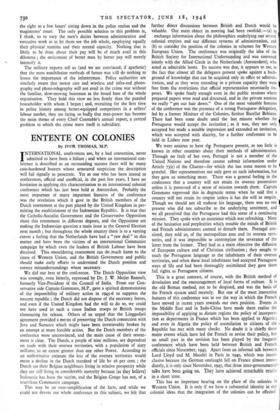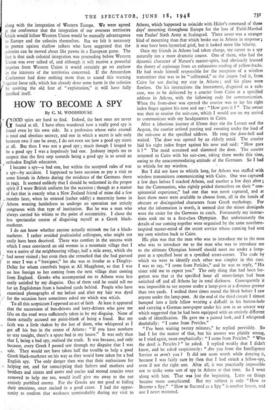ENTENTE ON COLONIES
By IVOR THOMAS, M.P.
NTERNATIONAL conferences are, by a bad convention, never
I
admitted to have been a failure ; and when an international con- ference is described as an outstanding success there will be many case-hardened hearers whose armoured scepticism the description will fail signally to penetrate. Yet as one who has been inured to conferences, official and unofficial, in the past few years, I have no hesitation in applying this characterisation to an international colonial conference which has just been held at Amsterdam. Probably the most important of many important features of the conference was the revelation which it gave to the British members of the Dutch resentment at the part played by the United Kingdom in per- mitting the establishment of the Indonesian Republic. It is true that the Catholic-Socialist Government and the Conservative Opposition share this resentment in different degrees, and the Opposition are making the Indonesian question a main issue at the General Election next month ; but throughout the whole country there is to a varying extent a feeling that the Netherlands have had a "raw deal" in this matter and have been the victims of an international Communist campaign by which even the leaders of British Labour have been deceived. This smouldering resentment can do _much harm to the cause of Western Union, and the British Government and public should make early efforts to understand the Dutch position and correct misunderstandings where necessary.
We did our best at the conference. The Dutch Opposition view was strongly, even bitterly, expressed by Dr. J. W. Meijer Ranneft, formerly Vice-President of the Council of India. From our Con- servative side Captain Gammans, M.P., gave a spirited demonstration of the impossibility of military action in 1945-6 to suppress the nascent republic ; the Dutch did not dispose of the necessary forces, and even if the United Kingdom had the will to do so, we could not have used in such a cause Indian troops or British troops clamouring for release. Others of us urged that the Linggadjati agreement provided a means of preserving the Dutch connection with Java and Sumatra which might have been irretrievably broken by an attempt at more forcible action. But the Dutch members of the conference were unconvinced, and the main cause of their resent- ment is clear. The Dutch, a people of nine millions, are dependent on trade with their oversea territories, with a population of sixty millions, to an extent greater than any other Power. According to an authoritative estimate the loss of the oversea territories would mean a decline in the Dutch standard of life by 16 per cent. ; the Dutch see their Belgian neighbours living in relative prosperity while they are still living in considerable austerity because (as they believe) Indonesia has been the victim, and the Belgian Congo has not, of a scurrilous Communist campaign.
This may be an over-simplification of the facts, and while we could not devote our whole conference to this subject, we felt that
further direct discussions between British and Dutch would be valuable. Our main object in meeting had been twofold : —(a) to exchange information about the philosophies underlying our several colonial empires and our different systems of administration, and (b) to consider the nosition of the colonies in schemes for Western European Union. The conference was originally the idea of the British Society for International Understanding and was convened jointly with the Allied Circle in the Netherlands (Amsterdam), who acted as admirable hosts. Its success was due, it appears to me, to the fact that almost all the delegates present spoke against a back- ground of knowledge that can be acquired only in office or adminis- tration, and as they were attending in a private capacity they were free from the restrictions that official representation necessarily im- poses. We spoke freely enough even in the public sessions where prepared papers were read and discussed, and in the private sessions we really " got our hair down." One of the most valuable features of the conference was the presence of a strong Portuguese delegation, led by a former Minister of the Colonies, Senhor Bacellar Bebiano. There had been some doubt until the last minute whether. the Portuguese would accept the invitation ; as it was, they not only accepted but made a notable impression and extended an invitation, which was accepted with alacrity, for a further conference to be held in Lisbon next year.
We were anxious to have Of Portuguese present, as too little is known in other countries about their methods of administration. Through no fault of her own, Portugal is not a member of the United Nations and therefore cannot submit information under Article 73(e) of the Charter—for which she has some reason to be grateful. Her representatives not only gave us such information, but they gave us something more. There was a general feeling in the conference that a country will not retain its oversea possessions unless it is possessed of a sense of mission towards them. Captain Gammans expressed this in dogmatic terms when he said that a country will not retain its empire unless it has the will to empire., Though we should not all endorse his language, there was no ones present who did not subscribe to the underlying sentiment, and we all perceived that the Portuguese had this sense of a continuing mission. They spoke with an assurance which was refreshing. None of the hesitation and perplexities which trouble the minds of British and French administrators seemed to disturb them. Portugal con- sisted, they told us, of the metropolitan area and its oversea terri- tories, and it was impossible to contemplate the severance of the latter from the former. They had as a main objective the diffusion of European culture and of Christian civilisation ; they sought to teach the Portuguese language to the inhabitants of their oversea territories, and when these local inhabitants had accepted Portuguese ways of life and had been thoroughly assimilated they gave them full rights as Portuguese citizens.
This is a great contrast, of course, with the British method of devolution and the encouragement of local forms of culture. It is the old Roman method, not to be despised, and was the basis of the French system until recently. But one of the most interesting features of this conference was to see the way in which the French have moved in recent years towards our own position. Events in the Middle East and in Indo-China have made them realise the impossibility of applying to distant regions the policy of incorpora- tion as departments in France which has been applied to Algeria ; and even in Algeria the policy of assimilation to citizens of the Republic has met with many checks. No doubt it is chiefly these major events which have led the French to revise their policy, but no small part in the revision• has been played by the frequent conferences which have been held between British and French officials since November, 1945. Apart from an informal talk between Lord Lloyd and M. Mandel in Paris in 194o, which was incon- clusive because the German onslaught fell on France almost imme- diately, it is only since November, 1945, that these inter-governmental talks have been going on. They have achieved remarkable results
in a short time.
This has an important bearing on the place of the colonies in Western Union. It is only if we have a substantial identity in our colonial ideas that the integration of the colonies can be effected along with the integration of Western Europe. We were agreed at the conference that the integration of our overseas territories which would follow Western Union would be mutually advantageous to Europe and the colonies themselves. But we felt it necessary to protest against shallow talkers who have suggested that the colonies can be moved about like pawns in a European game. The fact is that such colonial integration was proceeding before Western Union was ever talked of, and although it will receive a powerful impetus from Western Union it would certainly go on anyhow in the interests of the territories concerned. If the Amsterdam Conference had done nothing more than to sound this warning against loose talk, which has already done some harm in the colonies by reviving the old fear of " exploitation," it will have fully justified itself. -



































 Previous page
Previous page